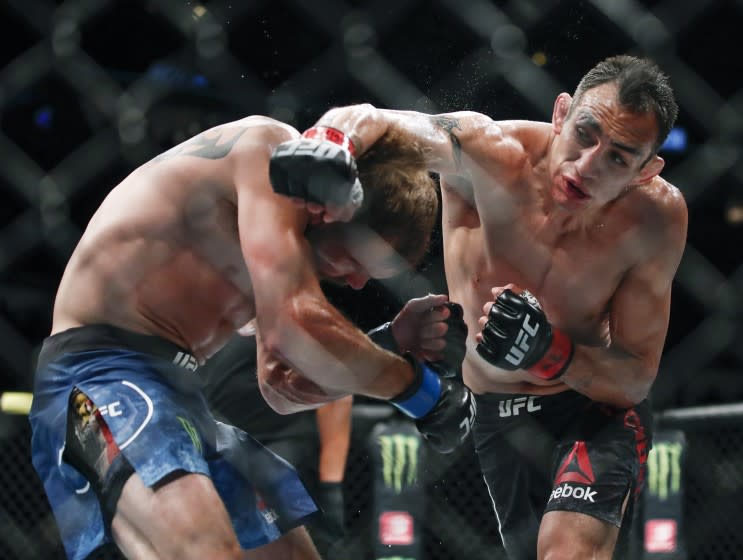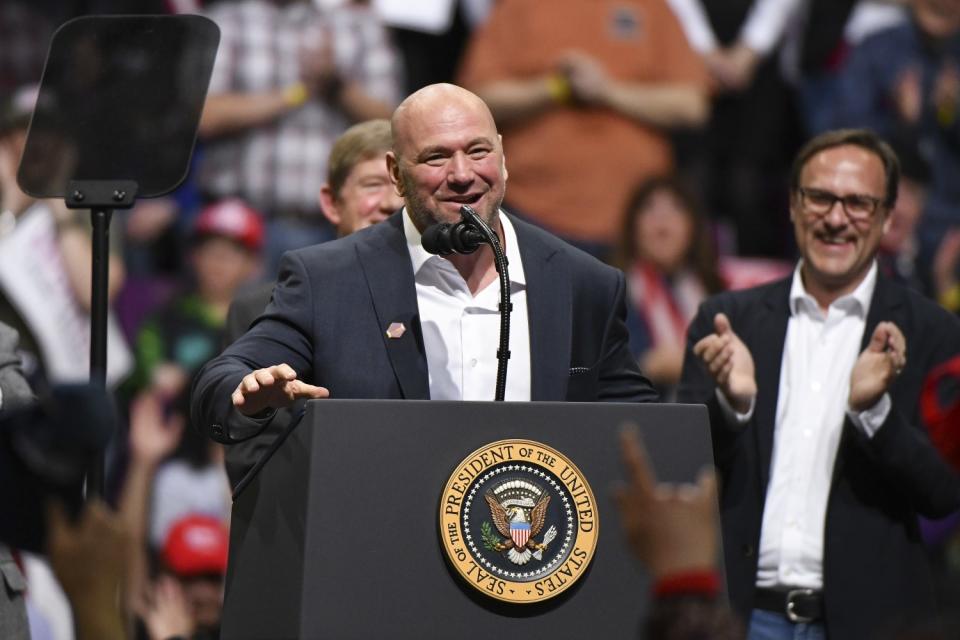Hernández: Staging fights amid coronavirus outbreak is a risk, but you have to understand UFC culture

John McCain was an ardent supporter of boxing, but the late senator’s affinity for hand-to-hand combat didn’t extend to mixed martial arts — at least not initially.
“Human cockfighting,” McCain called the sport.
Understanding why the Ultimate Fighting Championship is refusing to shut down in the middle of a global pandemic requires familiarity with the organization’s transformation in a multibillion-dollar business.
The defiance that UFC President Dana White showed this week when announcing Tony Ferguson would fight Justin Gaethje on April 18 was founded in the same us-against-the-world spirit that fueled the rise of what was once a fringe sport.
In addition to gradually winning over influential critics such as McCain, MMA overcame financial and regulatory obstacles on its way to passing boxing as the country’s combat sport of choice.
COVID-19 is but another opponent to be conquered.
That doesn’t mean the upcoming show should be staged. The UFC might be able to shape public opinion, but taming a virus is an entirely a different matter.
Bare-chested men wrestling and trading punches in the middle of a global pandemic is reckless, not only for safety reasons but also because the example it sets. Sports inspire, but in this case, what would they be promoting? The idea that collective efforts to slow the spread of the virus should be disregarded?
White didn’t divulge any specifics of UFC 249 outside of who would fight, and the guess here is that he won’t until right before the event. Delaying the release of information should limit how much White has to field pointed questions about the precautions he is taking.
White told TMZ Sports that he has secured a venue for UFC 249 and that he will continue to stage fights there for two months. Veteran MMA media personality Jeff Sherwood reported the site in question is a casino in Central California. Because the property is on tribal land, it’s exempt from the state’s ban on combat sports.
The UFC then plans to move its fights to a private island so international fights could take place.
This socially irresponsible but undeniably creative form of problem solving used to be the trademark of MMA’s drunk uncle, boxing. Historically, boxing has been opportunistic in ways other sports could never be.

If boxing promoters rationalize paying men from impoverished backgrounds to assault each other, they could justify to themselves taking morally dubious measures to secure funding or sell a fight.
Boxing’s devoted spectators have rarely pushed back, as they are people who value the stimulation of watching controlled violence to where they are willing to overlook, if not accept, the dark side of the sport.
The dynamics have allowed boxing to exploit racial tensions and accept financing from murderous dictators. Muhammad Ali’s historic upset of George Foreman was bankrolled by Mobutu Sese Seko of Zaire; Ali’s third fight against Joe Frazier was backed by Ferdinand Marcos of the Philippines.
Promoter Eddie Hearn’s search for acceptable purses for heavyweights Anthony Joshua and Andy Ruiz last year led him to Saudi Arabia. If Hearn was bothered by the Saudi government’s involvement in the murder of journalist Jamal Khashoggi or the country’s human rights record, he didn’t show it.
White is following this tradition, as he hopes to take advantage of a sports landscape that was wiped out by a pandemic.
People are trapped in their houses and desperate for live sports. The financial upside of UFC 249 is enormous.
There is also risk.
People won’t be able to gather to watch the fights and split the cost of the pay-per-view telecast at a time when the economy is taking a dive. Some will reject the show on the grounds that it appears to go against the country’s collective effort to slow down the spread of COVID-19, regardless of what precautions the UFC takes to ensure the safety of the participants.
White’s eagerness to push forward is an indication that he thinks there is potential for limited damage.
If MMA fans remained loyal to the UFC after White spoke in support of then-candidate Donald Trump at the Republican National Convention in 2016, they won’t turn their backs on him over this, regardless of whether any fighters test positive for COVID-19 after UFC 249.
Trump, who happens to be White’s friend, downplayed the severity of COVID-19 for weeks. Many states have been slow to prohibit public gatherings or close businesses. A number of governors and mayors have blood on their hands.
The avalanche of sins committed by these elected officials will bury White’s missteps. White isn’t alone and knows there is safety in numbers.

